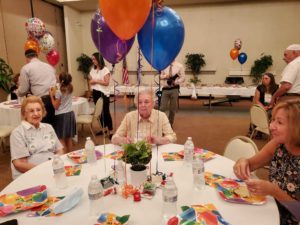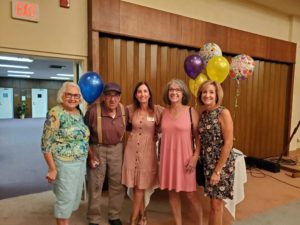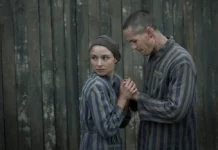
Louis Goldman is 85, but he attended his first birthday party just last week.
The Holocaust survivor living in Vineland, New Jersey, was joined by more than 10 other survivors for a birthday celebration as part of the Hope and Healing program created by the Jewish Family and Children’s Service of Southern New Jersey.
“I had a chance to meet with my fellow survivors and talk about the old times, how it was good to be alive … I enjoyed it,” Goldman said.
The Hope and Healing program, which convenes about 15 Holocaust survivors monthly to partake in yoga, art therapy and other activities, organized the celebration in tandem with Rosh Hashanah — a new year and an opportunity to celebrate birth and rebirth.
The program is also an opportunity to add joy and connection to the lives of survivors.
“During some of the conversations I’ve had with the clients, I found out that some of them never had a birthday party,” said Hope and Healing Coordinator Ronda Manders. “A lot of them lost their families during the Holocaust, so they didn’t have family to celebrate with afterwards or they didn’t feel like celebrating afterwards.”
The birthday party, held at Congregation Beth Israel, was attended by about 35 guests, mostly family and friends of the survivors, and featured survivors singing and playing harmonica, as well as cupcakes and personalized gift bags of apples and honey.
“Our goal is really to make sure that they know that we care about them, that we are there for them,” said Gail Belfer, director of JFCS of Southern New Jersey Holocaust Survivor Services and Advocacy.
Hope and Healing, the program within Holocaust Survivor Services and Advocacy, was created about three years ago as a way to engage with Vineland’s approximately 20 Holocaust survivors.
Though Vineland is technically in the geography covered by the Jewish Federation of Cumberland County, the Jewish Federation has no JFCS and, therefore, lacks the resources needed to take care of its survivor population. JFCS of Southern New Jersey has worked with Vineland’s Holocaust survivors for about a decade.
Before Hope and Healing, they would send over a social worker to manage cases. Later, they received a grant from the Jewish Federations of North America to help expand their person-centered, trauma-informed care and expand programs to be offered monthly. Jewish Federation of Cumberland County partners with them to help provide funding to support the social work services in Vineland.
“It really is taking into consideration all of the trauma, their background, what they had gone through, in forming programs that would really bring them joy, happiness, reduce their anxiety, help them cope with their negative thoughts and help them cope with challenges,” Belfer said.
JFCS identified Vineland’s Holocaust survivors as particularly important because of their isolated geography. Vineland is almost an hour from Cherry Hill; during the height of the pandemic, loneliness hit those survivors hard.
“For so long during COVID, these folks were in their homes by themselves,” JFCS Director of Marketing and Communications Rachael Ovitz said. “So it’s really only in the last couple of months that we started doing regular in-person programs again.”
Vineland was not always a sparse and isolated Jewish community. In the early 1950s, Jewish Holocaust refugees and survivors moved to the area to work on chicken farms.
“The Rothschilds purchased lands, gave them help, helped them get settled in the Vineland community, and it was vibrant,” Belfer said.
Vineland was home to multiple synagogues, kosher delis and butchers. However, as the survivors had children, the next generation moved away. The Jewish institutions closed down, but the survivors in the area stayed.
“They just don’t have the infrastructure, the network,” Belfer said. “There’s not a large Jewish community there anymore.”

Goldman is one of the survivors who moved to Vineland and lived on a chicken farm. He was born in Poland and survived the Holocaust by hiding in a basement with his family. At one point, he went blind in both eyes for four months, only gaining back full vision in one eye.
In 1949, Goldman came to the U.S. with his family, first moving to Williamsburg, Brooklyn, before settling in Vineland. Though he attended college and worked elsewhere for 20 years, Goldman eventually returned.
Today, Goldman relies on JFCS social workers to help him run errands, but he also finds profound joy in the opportunity to meet with fellow survivors. Many of them have known each other since childhood. Now older adults, they don’t need to share the tales of survivors; they’re happy to gather and just chat.
“It takes your mind off your aches and pains,” he said.






